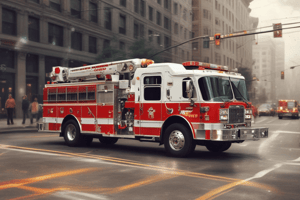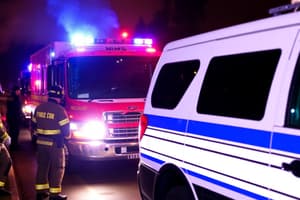Podcast
Questions and Answers
What is the maximum time frame within which formal debriefings are expected to be scheduled after a critical incident?
What is the maximum time frame within which formal debriefings are expected to be scheduled after a critical incident?
- Within 48 hours
- Within 36 hours
- Within 72 hours (correct)
- Within 12 hours
Who makes the determination on the need for a formal debriefing after a critical incident?
Who makes the determination on the need for a formal debriefing after a critical incident?
- The fire chief alone
- The entire CID Team
- The CID Team Leader and the Psychological Services representative (correct)
- The psychological services representative alone
What aspect of formal debriefings is considered voluntary for members involved in a critical incident?
What aspect of formal debriefings is considered voluntary for members involved in a critical incident?
- Review of incident reports
- Discussion participation during the debriefing (correct)
- Attendance at the debriefing
- Completion of follow-up surveys
What is the primary function of CID Team members regarding critical incidents?
What is the primary function of CID Team members regarding critical incidents?
Through whom are requests for the TFD CID Team by neighboring departments processed?
Through whom are requests for the TFD CID Team by neighboring departments processed?
What defines a critical incident for TFD personnel?
What defines a critical incident for TFD personnel?
Who supervises the critical incident debriefing sessions?
Who supervises the critical incident debriefing sessions?
What is the primary goal of the CID Team program?
What is the primary goal of the CID Team program?
Who can request a CID Team member response during an incident?
Who can request a CID Team member response during an incident?
In which scenario is a CID Team (when an incident can not be handled by one team member) likely to respond?
In which scenario is a CID Team (when an incident can not be handled by one team member) likely to respond?
Which group provides training and support during the debriefing sessions?
Which group provides training and support during the debriefing sessions?
What differentiates a critical incident debriefing from other meetings?
What differentiates a critical incident debriefing from other meetings?
What might be a result of exposure to a critical incident?
What might be a result of exposure to a critical incident?
What is the typical response composition for activating the CID Team during an incident?
What is the typical response composition for activating the CID Team during an incident?
Which statement accurately describes the role of the CID Team members regarding fit for duty evaluations?
Which statement accurately describes the role of the CID Team members regarding fit for duty evaluations?
What happens if a department member seeks assistance for critical incident stress?
What happens if a department member seeks assistance for critical incident stress?
When should initial response by the CID Team occur?
When should initial response by the CID Team occur?
What role does Psychological Services play during CID Team activations?
What role does Psychological Services play during CID Team activations?
How are team members activated at the scene of a critical incident?
How are team members activated at the scene of a critical incident?
What is emphasized as a crucial part of the CID Team's support approach?
What is emphasized as a crucial part of the CID Team's support approach?
How is the CID Team activated in cases of a major mass casualty incident?
How is the CID Team activated in cases of a major mass casualty incident?
What is the usual timing for formal debriefings following a critical incident?
What is the usual timing for formal debriefings following a critical incident?
Who is primarily responsible for approving the need for a formal debriefing?
Who is primarily responsible for approving the need for a formal debriefing?
Which statement best describes the role of CID Team members?
Which statement best describes the role of CID Team members?
What distinguishes a critical incident debriefing from other types of meetings?
What distinguishes a critical incident debriefing from other types of meetings?
CID team members will notify psychological services of any activation of the team ( anytime __ or more members respond to a critical incident)
CID team members will notify psychological services of any activation of the team ( anytime __ or more members respond to a critical incident)
Formal debriefings will be treated as normal in service ____
Formal debriefings will be treated as normal in service ____
Flashcards
Critical Incident Debriefing (CID) Team
Critical Incident Debriefing (CID) Team
A team of specially trained TFD personnel focused on helping colleagues manage reactions to stressful events.
Critical Incidents
Critical Incidents
Situations that can trigger strong emotional responses in firefighters, potentially impacting their ability to work effectively.
CID Team's Primary Goal
CID Team's Primary Goal
The main goal of the CID Team is to help TFD members cope with the emotional and physical aftereffects of critical incidents.
Requesting CID Team Response
Requesting CID Team Response
Signup and view all the flashcards
Individual Request for CID Team
Individual Request for CID Team
Signup and view all the flashcards
CID Team Activation Trigger
CID Team Activation Trigger
Signup and view all the flashcards
Initial CID Team Activation
Initial CID Team Activation
Signup and view all the flashcards
Adding CID Team Members
Adding CID Team Members
Signup and view all the flashcards
Psychological Services Involvement
Psychological Services Involvement
Signup and view all the flashcards
CID Team Role: Support, Not Evaluation
CID Team Role: Support, Not Evaluation
Signup and view all the flashcards
CID Team Services
CID Team Services
Signup and view all the flashcards
Psychological Service's Role
Psychological Service's Role
Signup and view all the flashcards
Deciding on Formal Debriefings
Deciding on Formal Debriefings
Signup and view all the flashcards
Timing of Formal Debriefings
Timing of Formal Debriefings
Signup and view all the flashcards
Debriefing Format and Attendance
Debriefing Format and Attendance
Signup and view all the flashcards
Debriefing Attendance Policy
Debriefing Attendance Policy
Signup and view all the flashcards
CID Team Assistance to Other Departments
CID Team Assistance to Other Departments
Signup and view all the flashcards
Managing CID Team Support Requests
Managing CID Team Support Requests
Signup and view all the flashcards
CID Team: Education and Information
CID Team: Education and Information
Signup and view all the flashcards
CID Team Members' Training
CID Team Members' Training
Signup and view all the flashcards
Formal Debriefing Process
Formal Debriefing Process
Signup and view all the flashcards
Timeline for Formal Debriefing
Timeline for Formal Debriefing
Signup and view all the flashcards
Purpose of Formal Debriefing
Purpose of Formal Debriefing
Signup and view all the flashcards
Study Notes
Critical Incident Debriefing Team (CID Team)
- A critical incident refers to situations that may evoke strong emotional reactions in TFD personnel, impacting their ability to function effectively.
- CID Team consists of specially trained members aimed at helping colleagues manage reactions to critical incidents.
- Critical incident debriefings provide a group setting for involved personnel to discuss their experiences, supervised by CID Team and Tulsa Psychological Services personnel.
- The primary goal of the CID Team is to assist department members in resolving potential physical and emotional aftereffects of critical incidents.
Requesting and Activating CID Team Response
- Any Incident Commander (IC) or Fire Chief may request a CID Team member through the on-duty shift coordinator during or after an incident.
- Individual members can also request CID Team support by directly contacting the IC or a CID Team member post-incident.
- A CID Team member typically responds to incidents with four or more severe injuries or fatalities.
Activating Additional Team Members
- Initial activation of the CID Team usually involves two to three members; larger activations are rare and typically reserved for significant mass casualty incidents.
- The on-duty CID Team member can request additional members based on assessed needs.
- Psychological Services must be notified of any team activation involving multiple members, and they provide representatives for major incidents and subsequent formal debriefings.
CID Team Roles and Services
- CID Team members cannot conduct fit-for-duty evaluations; they focus on supporting individuals affected by critical incidents.
- Team members are resources for critical incident stress and can provide information and educational support, not therapeutic counseling.
- Psychological Services offer consultation and counseling for department members seeking assistance post-incident.
Formal Debriefings
- The CID Team Leader along with Psychological Services will determine the need for formal debriefings after a critical incident, subject to the Fire Chief's approval.
- Debriefings are usually scheduled 24 to 72 hours post-incident and treated as in-service training.
- Attendance for impacted members is mandatory, though participation in discussions is voluntary, and attendance is exclusive to those involved in the incident.
Requests from Neighboring Departments
- Neighboring departments may request assistance from the TFD CID Team, coordinated through the Fire Chief and CID Team Leader.
- Requests are managed to ensure the timing of the response aligns with the needs of the requesting agency and available CID Team resources.
CID Team Overview
- CID Team members possess specialized training for educating and informing about critical incident stress, but are not licensed counselors or therapists.
Formal Debriefing Procedure
- A formal debriefing is determined by the CID Team Leader and a representative from Psychological Services, pending the fire chief's approval.
- Debriefings typically occur between 24 to 72 hours after a critical incident, ensuring adequate time for assessment and preparation.
Studying That Suits You
Use AI to generate personalized quizzes and flashcards to suit your learning preferences.




